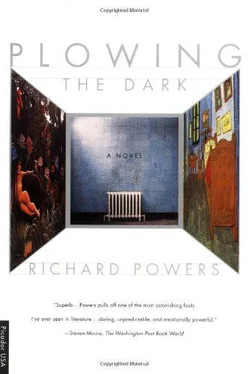Rajasundaran wagged his digit. Not a team player. Does not work and play well with others.
That's not true, Adie demurred. He 's more sociable than most of you
crazies.
Oh, right, Raj said. As if you starving artistes get a clean bill of health
in the social interaction department?
Spider waved his hands for peace. No biggie, guys. My Boolean-blood barrier is just a little weak.
And that was the only possible diagnosis. Lim was like one of those sing-along car drivers whose speed halved whenever the tune on the radio slowed from boogie to ballad. He'd never done well in the Cavern for extended periods. Simulator sickness got him every time. When the simulation plunged from great heights, his ears popped. A simple projection of the winter constellations against the ceiling gave him hypothermia. He couldn't work on a circuit without simulating it in his own circulatory system. The same data traversing the chutes of gated arrays invariably ported over to that other platform, to bang around inside the test bed of Spider's cells.
The health scare subsiding, Adie exploited the gathered experts. My jungle is a ghost. I pass right through every plant in it. I should bounce off the rubber trees. At least rustle the ivy.
Spiegel nodded. You need collision detection. Yeah, give me one of those. Are they expensive? Collision had already cost the team a tidy sum of man-months. It wasn't enough for a garden-variety mushroom sprouting in the Cavern simply to look like one. Even a toadstool needed heft and weight and resistance. A simulated object had to bend or droop or bruise or any of several dozen other verbs that real things did when bumped up against in the grotto that the Cavern stood for.
Multiple coders had already implemented a reasonable fraction of collision's class library. They wrote out methods for a whole host of impacts. Each calculated aftermath got its own mongrel differential equations, trajectories mocking the ones that nature invented. Various variables toted up mass and speed and English, calculating the thresholds between bounce and break, between shatter and slide and spin.
Spiegel showed her how, from out of this catalogue of cases, to assign verbs for each set of possible contacts: hand on vine, vine on bird, bird on monkey, monkey on tree limb, limb on hand. In the course of several weeks, Adie watched as software turned her jungle into a gym. The forest became a vast calculator, a gnarled orchard of countless parallel computations. Over the run of days, any pair of objects learned to calculate what to do when they met one another in space.
But calculation cost; the display code carried so much overhead that it ran too slowly to keep up with its events. Adie released a gingko ball in the air above her canopy. The seedy mace slid down the slope of its infinitesimal accelerations until it struck some surprise tendril or trunk. Contact produced a pop, then seized up. That wall's graphics buffer promptly dropped several frames while its reality engine did the myriad integrals needed to determine the respective obligations of striker and struck. The gingko pod hung in space, waiting for math to decide its fate.
Such a hiccup was not acceptable. Any jerk in the animation and the game was up. Material reality's supreme Cray never dropped frames. That's how you knew you were in the real world: all the flicker-free, smooth scrolling. The Cavern's goal — believability through total immersion — could not survive an image that sputtered.
Spiegel and Jackdaw worked up provisional fixes, clever step-saving approximations that shortcut the Cavern's calculations, cheats that would cover until Spider and the hardware boys could bring in more firepower. Continuous collision detection arrived after two triple-shift weeks during which, when Spider slept at all, he slept on a bed of fan-fold paper spread two inches deep on the stockroom floor. He woke on that pallet one morning, the socket of his right eye richly black-and-blue, three shades deeper than his sepia skin.
O'Reilly, the Ulster economist, took one look and whistled. Jays. Some shiner. I wasn't aware that you were currently involved with anyone.
The glossy maroon smear entranced Sue Loque. Ooh. That's a beauty. Can I touch it?
No, of course you cant touch it. You're perverts. All of you.
Christ on a crutch, Spider, Sue said. Don't be such a prude.
Spider laughed, one of those single-syllable, apologize-for-existing laughs, still intact from his first few years of Korean existence.
When Adie saw the black eye, she lost it. Oh no. God help us. Look at I've done.
You? You haven't done anything. I've been sleeping on a hard mattress, is all.
You don't remember? Yesterday? Testing the back layers?
What are you talking about?
You dont remember running into that tree branch? She'd seen him wince.
Oh no, no, no. Dont be crazy.
A sympathetic fall in blood sugar lay within the realm of material possibility. But a virtual bruise… It fell too far outside his world model. Yet no real day's accident explained the shiner any better.
Maybe this Klarpol woman is right, Raj said. He milked the lilt of Hindu eschatology. We've seen such things produced from out of your
brain before.
Spiegel piled on. Why not? Impale the brain with something believable, and belief will leave its record in the skin.
That's nuts, Lim insisted. A black eye needs a real impact. Spoken with a true hardware bias.
I have to agree with Spiegel, Rajasundaran said. True, the switches execute the code. But also true, the code still sets the switches.
Loque fingered the wound, over Lim's objections. You boys are making some real progress in veridicality.
Spider Lim, Spiegel said. The man who became his own collision
algorithm.
At these words, Lim's whole body blushed so deeply that his bruise vanished into the general background rose.
In the privacy of their own workstations, each player in the game mounted a run at that same threshold of belief. The heart of the Realization Lab beat to a single paradox. It hoped to mechanize any brute incident that existence offered. But imitation was itself just the first step in a greater program, the final escape from brute matter: the room that would replace the one where existence lay bound.
Spider's bruise prompted the Rousseau Room's first working demo. Artists and engineers alike turned out to see just how palpable Adie's mythic branches — the product of collective fiat — had in fact become. Color met number, fact chased invention through the shadows of an undergrowth past evolution's power to imagine.
All was yet still. The python hung slung in mid-slither. The birds held open their beaks to caw. The elephant readied to trumpet and the monkeys to scamper. The lions cocked their quizzical heads at this mass tourist intrusion. And spreading vegetation bent the white, oil-paint moonlight into as many greens as the viewing mind could grasp.
Spiegel presided, showing off the luscious prototype, their object lesson in objects. He took all parties on a walking tour as deep into the jungle as the jungle went. He pointed out the details of stalk and stamen, all spelled out in structured data — the crazy Frenchman's mother-in-law tongues turned tropical Egyptian. He popped the hood and revealed the diorama's underpinning gears. He laid out every effect they'd managed to produce. But he did not know what he was looking at until Adie told him.
We did this, the woman said. She clapped her hands together in what only Karl Ebesen recognized as a proof-perfect knockoff of St. Theresa's ecstasy. We made this! It's so beautiful.
Читать дальше












